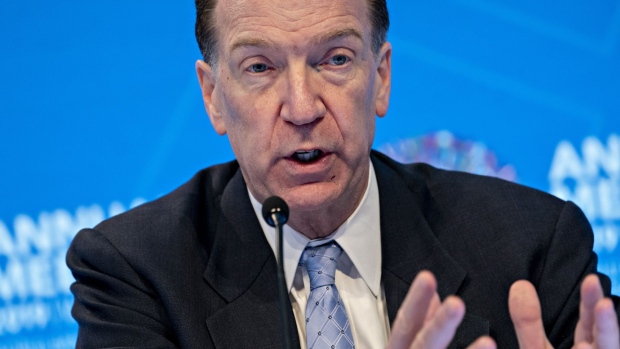Oct 14, 2020
G20 extends debt relief plan amid warnings it's not enough
, Bloomberg News

The world’s richest nations agreed to renew a debt-relief initiative for the poorest through at least the first half of 2021, falling short of a World Bank call for a full-year extension as the coronavirus pandemic entrenches poverty.
The G20, in a communique issued by Saudi Arabia, which holds the bloc’s presidency, said it could order another six-month extension next year. The communique said the G20 members were disappointed at the lack of progress in extending the debt-relief plan to involve private creditors.
In an online press conference, World Bank President David Malpass urged more steps for meaningful debt reduction. “It’s urgent to make rapid progress on a framework because the risk of disorderly defaults is rising,” he said.
The consequences for some countries are dire. African nations face a financing gap of US$345 billion through 2023, the IMF said last week, with some forced to choose between servicing debt or spending on social and health programs.
Private Credit
The group of industrialized economies unveiled the Debt Service Suspension Initiative in April to provide billions of dollars in relief for 73 eligible nations. So far, more than 40 have applied for the help that was set to run through the end of December, most in sub-Saharan Africa. The World Bank estimates countries could save US$12 billion owed to government creditors this year.
Eligible countries can also ask private creditors to freeze repayments, but only a few have done so -- a major failing according to advocacy groups. That point was also taken up by International Monetary Fund Managing Director Kristalina Georgieva on Wednesday.
The private sector has “regrettably” shied away from debt relief, she said in a virtual news conference. Meanwhile, “countries themselves shied away from asking the private sector because of fears that that may erode their future access to markets, access they have earned the hard way in previous years,” she said.
China Role
Malpass had called on the G20 to extend debt relief until the end of next year, and said that hedge funds and China should participate more. China is owed almost 60% of the bilateral debt that the world’s poorest nations would be due to repay this year.
He won support from German Finance Minister Olaf Scholz, who on Wednesday called for a deal that includes “a lot of other countries which are not participating in the debt suspension now.” China has to be “part of the solution,” he said.
Advocacy groups like the European Network on Debt and Development say government relief alone is insufficient. In a recent report, it likened the initiative to “draining out the Titanic with a bucket” and argued it only pushed debt crisis risks “further down the road.”
Tech Tax
A lack of participation by private and multilateral lenders limited the program’s impact, the network said, noting that only 24 per cent of debt payments due by beneficiary countries between May and December 2020 were subject to the potential suspension.
Extending it to the first half of 2021 would cover 44 per cent of debt payments by the countries that had requested participation, according to the report.
The G20 was also expected to discuss digital taxation, but said the pandemic had affected work to that end. Disagreements between the European Union and President Donald Trump’s administration have also hobbled years-long talks on new rules. The Organization for Economic Cooperation and Development now aims to conclude the process by mid-2021, raising the risk of a transatlantic trade conflict and a proliferation of contentious national levies on global tech giants.
